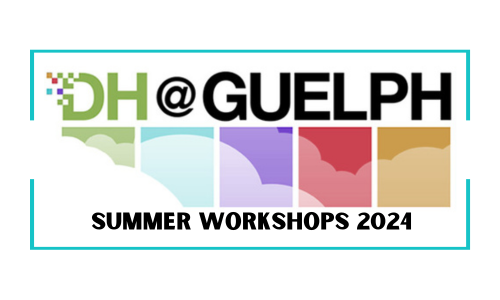Instructors

Paul Barrett (he/him | University of Guelph)
is an Assistant Professor in the School of English and Theatre Studies and Culture and Technology Studies at the University of Guelph. He is the author of Blackening Canada: Diaspora, Race, Multiculturalism and the editor of ‘Membering Austin Clarke. His research is situated at the intersections of Canadian literature, critical race theory, and digital humanities. Paul is teaching Introduction to Python Data Analysis.
Robin Bergart (she/her | University of Guelph)
is a member of the UX team for the Linked Infrastructure for Networked Cultural Scholarship. She is an Assessment & User Experience Librarian at the University of Guelph Library.
Susan Brown (she/her | University of Guelph)
is Professor of English and Canada Research Chair in Collaborative Digital Scholarship at the University of Guelph, and Director of THINC Lab. She researches Victorian literature, women’s writing, and digital humanities, and leads the Canadian Writing Research Collaboratory (CWRC) and Linked Infrastructure for Networked Cultural Scholarship (LINCS) projects. Susan is co-teaching Making Connections: The Semantic Web for Humanities Scholars.
Ar Ducao (she/her | New York University)
is a professor at NYU School of Engineering, NYU School of the Arts, NYU Prison Education Program, and MIT Introduction to Technology and Science. She has been a 3D animator for more than twenty years, animating for groups including the American Museum of Natural History, NASA, NOAA, University of Chicago, and other organizations. She currently creates character-driven short films through her small firm DuKode Studio, dukodestudio.com. My teaching site is senseandscale.info. Ar will be teaching Simple 3D Animation for Digital Humanities
Arun Jacob (he/him | University of Toronto)
is a doctoral candidate at the Faculty of Information. He completed his Master of Arts in Cultural Studies and Critical Theory and Master of Arts in Work and Society at McMaster University, Hamilton, Ontario, and his Master of Professional Communication from Toronto Metropolitan University. Arun's doctoral work unites media genealogy, intersectional feminist media studies, and critical university studies to explore how contemporary university data management techniques and information management systems shape our socio-cultural relations, experiences, and knowledge. Arun is co-teaching Approaching Media Archaeology from a Digital Humanities Perspective: Introduction, Tools, and Techniques.
digital humanities scholarship and pedagogy, early modern British literature and drama (especially its intersection and enhancements using DH tools and methods), as well as visual rhetoric, and multimedia theory and design
Diane Jakacki (she/her | Bucknell University)
Kim Martin (she/her | University of Guelph)
is an Assistant Professor in the History Department and the Associate Director of THINC Lab. Her current research investigates opportunities for serendipity on the semantic web, and she is the Research Board Chair for Linked Infrastructure for Networked Cultural Scholarship (LINCS) project. Kim is co-teaching Making Connections: The Semantic Web for Humanities Scholars.
Jennifer Marvin (she/her | University of Guelph)
is the Interim Head of the Research & Scholarship Team at the McLaughlin Library. She works in the Data Resource Centre (DRC) and specializes in data visualization. Jennifer will be teaching Uncovering Hidden Trends & Patterns Using Data Visualization.
Alliyya Mo (she/her | University of Guelph)
is Data Interface Developer with the Linked Infrastructure for Networked Cultural Scholarship (LINCS). She completed her Bachelor of Computing at the University of Guelph. Alliyya will be co-teaching Making Connections: The Semantic Web for Humanities Scholars.
Sarah Roger (she/her | University of Guelph)
is the project manager for the Linked Infrastructure for Networked Cultural Scholarship (LINCS). She has completed her Bachelor of Computing at the University of Guelph. . She has a PhD in literature and is the co-editor of Future Horizons: Canadian Digital Humanities (2023). She will be co-teaching Making Connections: The Semantic Web for Humanities Scholars.
Chelcie Rowell (she/her | Harvard University)
is a practitioner-manager and Associate Head of Digital Collections Discovery at Harvard Library. She makes digital special collections findable and usable for the purposes of scholarship, teaching, learning, artistic practice, and personal use. Together with her colleagues, she designs, implements, and maintains infrastructure for digital collections and exhibitions based on deep engagement with users and strong partnership with other units. Chelcie will be teaching A Safer Internet for All: Self-Care and Community Care in Online Spaces.
Paula Sanchez Nuñez de Villavicencio (she/her | University of Toronto)
is a PhD candidate in the Faculty of Information at the University of Toronto and a Jackman Humanities Graduate Fellow. Her research focuses on the historical and political dimensions of media technology used for the governance and surveillance of select populations. Specifically, her work looks at wearable technology and their role in shaping human conduct in different information systems, as well as their ethical implications. In broader terms, she is interested in information behaviours and practices, wearable technology, systems of AR, digital humanities and ethics. Paula is co-teaching Approaching Media Archaeology from a Digital Humanities Perspective: Introduction, Tools, and Techniques.